
by John Boston
Oh groan. The lead story in the June 1962 Amazing is Thunder in Space by Lester del Rey. He’s been at this for 25 years and well knows that in space, no one can hear—oh, never mind. I know, it’s a metaphor—but’s it’s dumb in context and cliched regardless of context. Quickly turning the page, I'm slightly mollified, seeing that the story is about Cold War politics. My favorite!
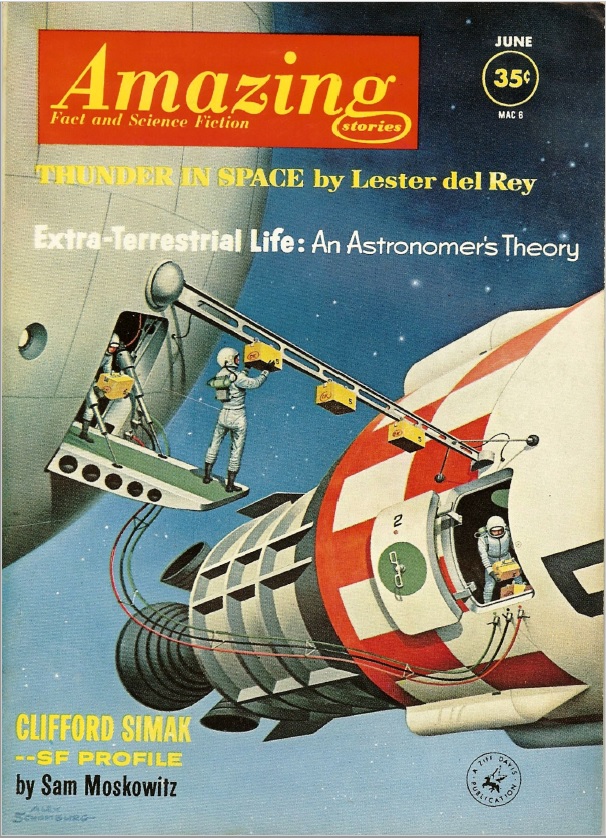
Only a few weeks ago, one of my teachers assigned us all to write essays about current affairs, to be read to the rest of the class. Mine suggested that the government of China is no more to be found on Taiwan than the government of the United States is in London, and it might be wise to drop the current pretense keeping Taiwan in China’s United Nations seat, along with the fantasy of invading mainland China and reinstating Chiang Kai-shek to the power he couldn’t hold on to. After I had read this, one of the other students turned to me and said, “John . . . are you a communist?” I assured him I am not, but in hindsight, I should have said, “That’s right, Jimmy. I get my orders straight from Albania.”
Compared to this black and white comic-strip world-view, Thunder in Space is a masterpiece of sophistication—it’s at least on the level of the Sunday funnies, which are in color. (A few colors, anyway.) There are two nuclear-armed space stations, the US Goddard and the Russian Tsiolkovsky. An apparent accident destroys the Soviet space fleet, and the American government refuses to help out by resupplying their station unless they unilaterally disarm it.
But our boys in space are having none of it, and our and their space crews realize they have more in common with each other than with their governments, so there’ll be some changes made. This feel-good fable for SF fans and other technophiles is not especially plausible—the response of governments to insurrection on military bases in low orbit would likely be speedy and definitive—but the story is reasonably readable and conventionally well-assembled, and refreshing in the acknowledgment that our leadership may be as brutal and ruthless as theirs. On the other hand, del Rey can’t let the title go, and there are annoying attempts to justify it, such as one character’s declaration that “Most of the thunder down there is caused by the chained lightning we’re carrying up here.” Three grudging stars.
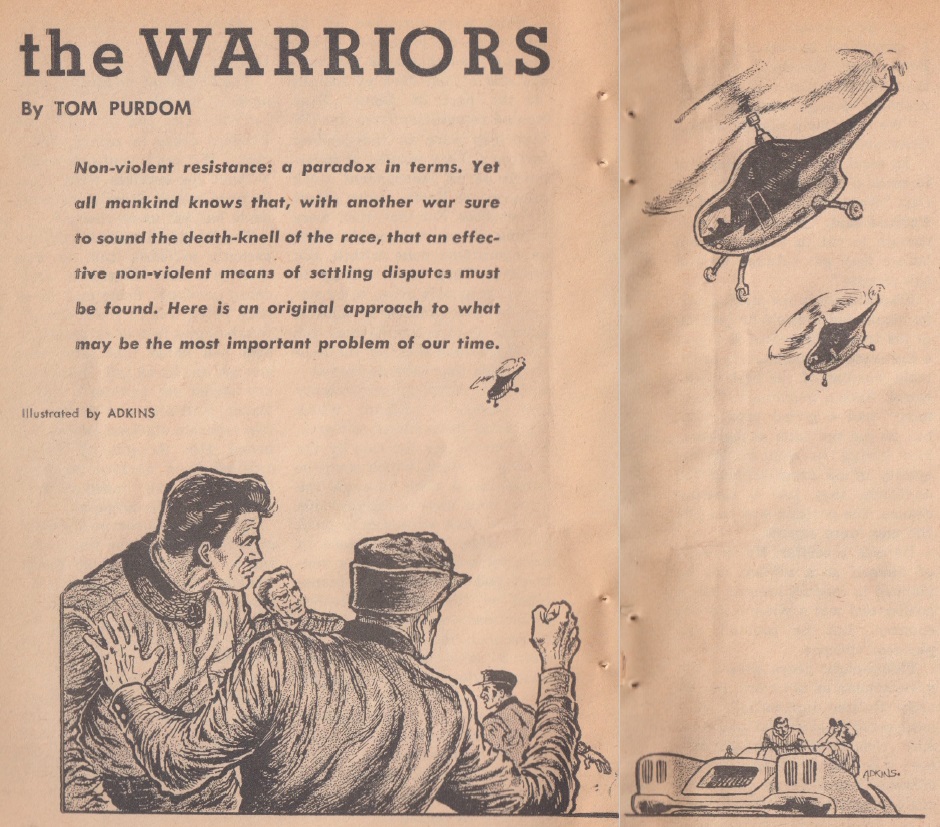
Near-future political problems also preoccupy Tom Purdom in The Warriors, in which a foreign mercenary force is struggling to get to the airport despite the resistance of the local forces. But violence has been abolished! So the contending mercenary armies maneuver respectively to evade and to block each other, since touching in combat is now a crime, and the result is a taut narrative of bobbing and weaving. This all seemed silly and annoying at first, but maybe that’s the point: we’ve got to do something to abolish warfare as we know it, and if not this, what? Got a better idea?
So it’s at least thought-provoking: but there’s something else to think about here too. The casus belli is the USA’s attempt to spirit away the African country Belderkan’s resident genius, Doctor Warren, whose inventions have helped make Belderkan prosperous; the locals are trying to get to him to persuade him to change his mind.
Right now, we’re in the age of decolonization. Almost 20 countries have become independent in the last couple of years; Algeria will vote on independence in July, after years of bloody warfare. But will their independence be real, or just another guise for the exploitation of their resources by more powerful countries? Consider the former Belgian Congo, which elected someone a little too independent for some tastes, who was quickly deposed and murdered in a rebellion sponsored by the ex-colonial power (and, it is rumored, by others, maybe including us). I’m not sure Purdom meant to evoke all these concerns, or if he just needed a plot motor, but either way, the result is to his credit and mitigates the story’s weakness as fiction. Three stars.
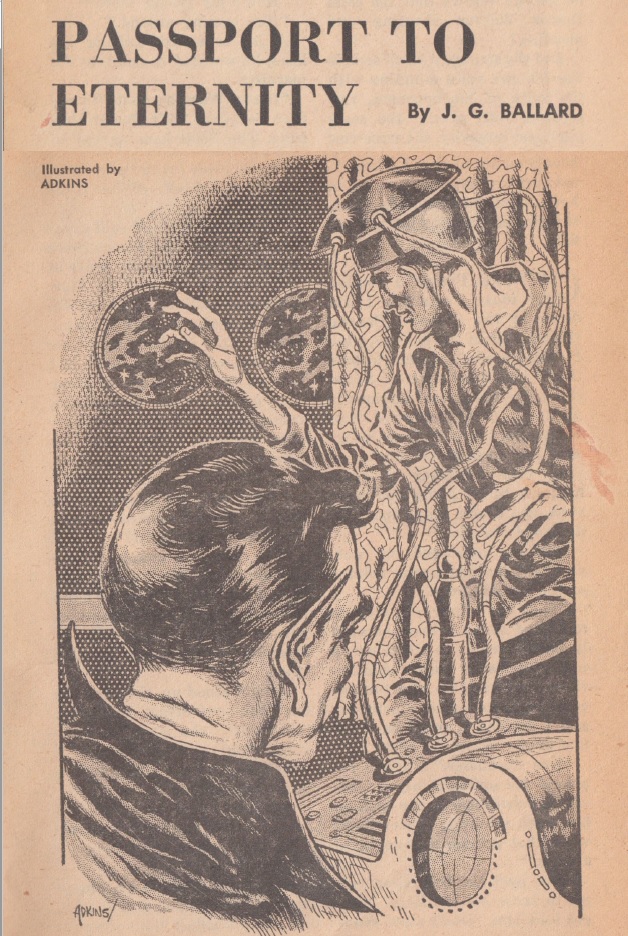
But enough of politics; let’s have something gaudy and irresponsible. The most well-turned piece of fiction here is from J.G. Ballard, though Passport to Eternity is not among his best. It’s a trifle about an affluent, bored future couple trying to decide where to go on vacation. Each option is more ridiculous than the last, and then the options show up uninvited at their house with their sales pitches. It ends badly.
This hectic lampoon is mostly a satire on the profligate and disjointed invention of much grade-B SF. Ballard refers to clothing made of “bioplastic materials,” then: “Upstairs in her wardrobes the gowns and dresses purred on their hangers like the drowsing inmates of some exquisite arboreal zoo.” Or: “She was a Canopan slave, hot-housed out of imported germ, a slender green-skinned beauty with moth-like fluttering gills.” So: amusing, but in an hour you’ll be hungry again. The story’s first line, “It was half past love on New Day in Zenith and the clocks were striking heaven,” recalls the famous first line of Orwell’s 1984. Is Ballard comparing the tyranny of excessive consumer choice to the tyranny of Big Brother? Beats me. Three stars, plus for style and minus for content.
(Note that in this one-dimensional rating system, the middle rating covers a multitude of sins and virtues in various combinations.) [One dimensional indeed! (ED)]

This month’s Classic Reprint is a cut above the usual: ridiculous, but amusingly so, rather than stupidly or offensively. The Council of Drones by the mysterious W.K. Sonneman, from the October 1936 issue, follows a standard plot of the times: ordinary guy, Fred, living on his father’s farm, is invited by his friend the brilliant scientist to see his invention; things go wrong; perilous adventures ensue. This time it’s “Cross-Rays, with Lifex Modulation”: swapping of human consciousness with other organisms. Fred’s father keeps bees, so obviously Fred’s consciousness should be swapped with a queen bee’s. But the promised five minutes turns into hours and days. Fred is in despair. But then his father comes, smoking the hive and stealing the honey, and Fred, enraged, goes bee, as it were.
He persuades the other bees to go along with his schemes, first of self-defense and then of . . . why not . . . world domination, much assisted by the fact that bees from the eggs the queen lays after the insertion of human intelligence are themselves pretty intelligent. This is all done straight, or at least straight-faced, with a number of apiaristic footnotes along the way. Sam Moskowitz’s introduction praises the author’s “intimate knowledge of the bee society,” plausibly speculates that he was a beekeeper himself, and touts the value of “scientifically informative science fiction.” (Come back Lamarck, all is forgiven!) Three charmingly archaic stars.
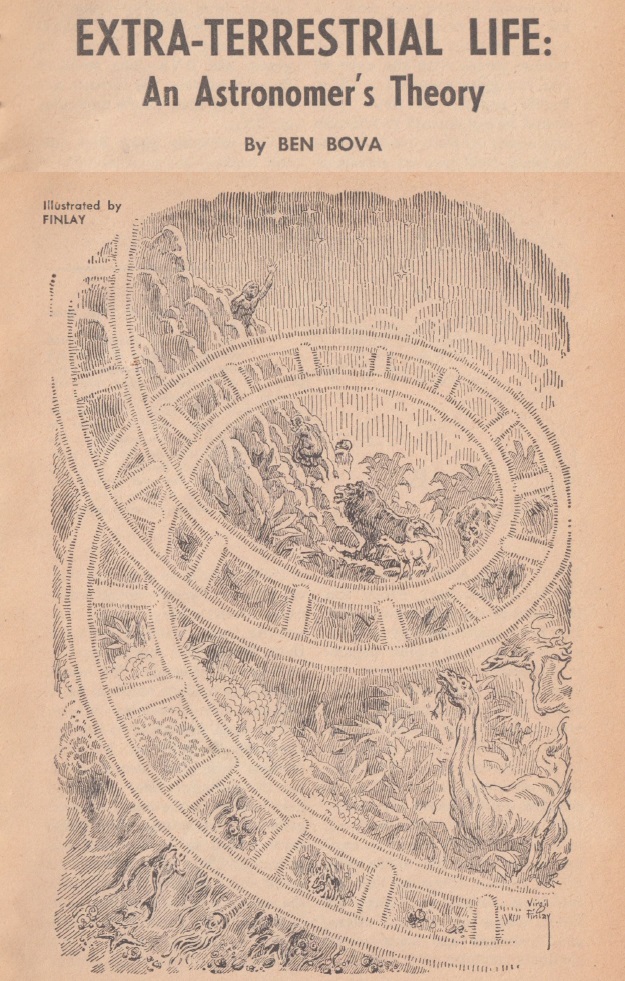
Ben Bova is back, this time with a science article, Extra-Terrestrial Life: An Astronomer’s Theory. It is a somewhat rambling and disorganized article touching on how life arose on Earth and what it might look like elsewhere, by way of much biochemistry, emphasizing this DNA stuff we are starting to hear a lot about. But Bova is an engaging writer and there’s a lot of interesting information here. Three stars.
Bova is also featured in the editorial, complete with low-resolution photo, making me wonder whether he is about to replace the unfortunately dull Frank Tinsley as the regular science-monger. Incidentally, the astronomer of the title is Bova, employed as a “technical communications executive,” but also described as “an ardent amateur astronomer.”
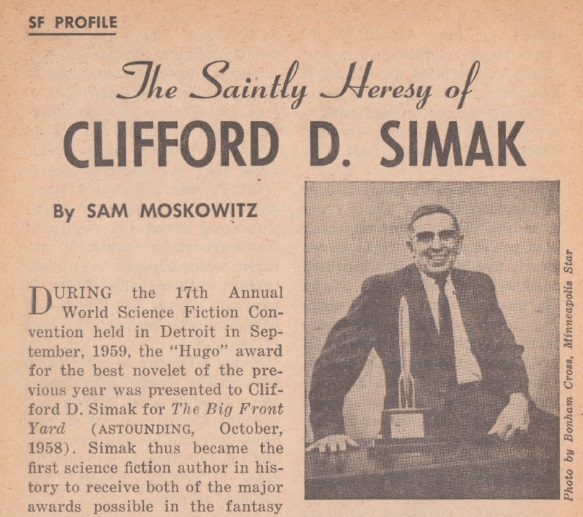
Sam Moskowitz contributes another “SF Profile,” this one The Saintly Heresy of Clifford D. Simak.” It’s reasonably perceptive and informative, but—like his profile of Theodore Sturgeon—it neglects Simak’s excellent recent stories while dwelling in detail on his apprentice work of the 1930s, with no mention, for example, of his well-received novels Ring Around the Sun (1953) and last year’s Time Is the Simplest Thing. And Moskowitz’s clumsy and often outright ungrammatical writing is even more noticeable than usual. Three stars.
And finally . . . to break the three-star monotony . . .
Bndct Brdfrt.

My eye always goes to the artwork, Adkins illo for the Warriors reminds me of how much Freas and Emsh have influenced the visual realization of modern prose SF. Both Hubert Rogers and Ed Cartier* were getting there. It was not just the setting and theme that Freas and Emsh illustrated but costume , architecture and instrumentality , as no artist had quite done before.
*Cartier was a remarkable magician with fantasy art (tho he was a good SF artist) , alas he stopped working around 1950 and started designing wall paper ! Never returned.
I think one of the advantages that Amazing has is Finlay as an illustrator. I look forward to his back covers, although I thought the Adkins this month was fine.
Another good review from John. I agree about the Ballard. Some lovely touches but I couldn't work out what the point of some of the lampooning was. Including some obscure references to the British income tax code probably made sense to someone but not to me.
I tend to just discount the reprints now, but I'll go back and give the Sonneman a go, on John's recommendation.
Maybe Ashley Pollard knows?
I'll have to read the story to answer that and at this point in time I'm slaving over a hot keyboard.
Those electric typewriters can run hot… but the keys are so much easier to handle than on those manuals!
Finlay was better at fantasy art . He really had a feel for a textured mood. As for hard SF he was a skilled craftsman but was not as inventive as he was with his fantasy illos.
I can't say I was terribly impressed. Miss Goldsmith got off to a good start, but the last few issues have been fairly weak. Not terrible, but weak.
The del Rey wasn't bad. It was at least an enjoyable read, even if the ending was a bit contrived and hard to swallow.
Tom Purdom's story was another with a premise that made me work hard to suspend my disbelief. However, it was an interesting counterpoint to his story last year, "The Green Beret". Purdom and Mack Reynolds seem to be about the only authors giving Africa even the slightest consideration. I would think there is a great deal of story opportunities there.
Ballard lost me very early in his tale and never regained my interest. The whole thing became increasingly surreal and I have no idea what was going on at the end. Alas, this seems to be typical of the Ballard I've encountered. I understand he's reasonably popular in Great Britain. Maybe his best stuff hasn't made it across the pond yet.
After that, the issue just had little for me. The reprint might be interesting, but I have this thing about insects. Sam Moskowitz's style could best be described as "turgid". And for a man who apparently makes his living communicating scientific matters to non-scientists, Mr. Bova should be a lot more engaging.
Finally, Randall, please. I beg you. In the name of all that's holy, stop. Just stop.
I've been saying that since 1958…
Not a bad issue, to my way of thinking. (Although, to be honest, I can't get myself to read the "classic" reprints anymore. Just too old-fashioned for my taste.)
"Thunder in Space" seemed quite realistic and convincing, at least at first. If only I could believe that people could really set aside their differences and work things out like the space explorers in this story do.
"The Warriors" was also implausible in its depiction of universal non-violence, but once you accept the premise it was a powerful story. It's interesting to note that both sides of the "war" had a strong case.
"Passport to Eternity" was actually my favorite story in the issue. I really like Ballard's style and unique concepts. This one was lighter in tone than much of his work, but it still captivated me.
It was amazing how much Ms. Goldsmith was able to accomplish with so little in the way of resources. She managed to attract "name" talent (even though the quality of the work wasn't great) and she certainly produced an attractive product.